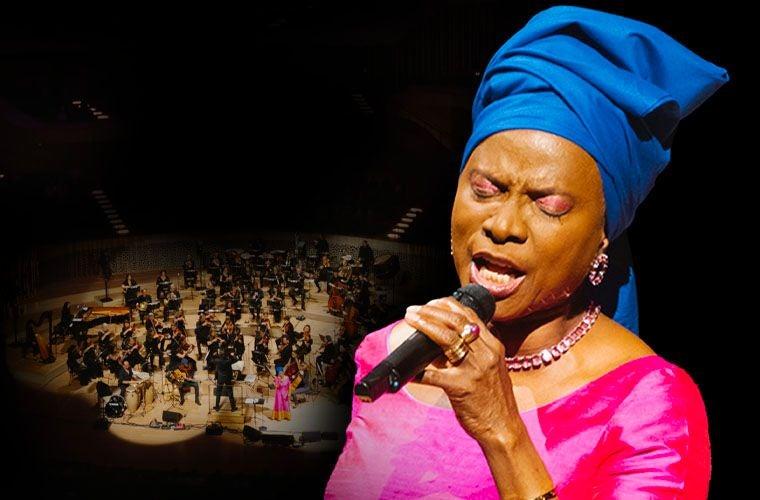
Caption
Grammy winning singer Angelique Kidjo is bringing her African Symphony with the Atlanta Pops Orchestra at Atlanta Symphony Hall on March 30, 2025.
Credit: Courtesy of Angelique Kidjo
Grammy winning singer Angelique Kidjo is known for her positive outlook and high energy live performances. She spoke with GPB's Kristi York Wooten to talk about her upcoming shows.

Grammy winning singer Angelique Kidjo is bringing her African Symphony with the Atlanta Pops Orchestra at Atlanta Symphony Hall on March 30, 2025.
African superstar Angélique Kidjo wowed Georgia audiences and PBS viewers with her voice and dance moves at the Jimmy Carter 100 concert in Atlanta last fall, just as she did when she sang at the former president's 2002 Nobel Peace Prize ceremony. Now she’s back with two unique shows in Georgia this month.
From her appearance on NPR's Tiny Desk to the recent reopening of Notre Dame cathedral in Paris, Kidjo performs with an energy unlike any other international hitmaker. Born in Benin in West Africa, she was raised on the sounds of Nigerian musician Fela Kuti and South African singer Miriam Makeba.
Kidjo began making her own music at a young age and has since won five Grammy awards (to match the number of languages she speaks).
Her love and joy for music have always been with her, "because I loved seeing my father playing the banjo, my mum singing and playing the clarinet," she told GPB. "That's where I grew up. There's no day where music is not part of my life. Music and sport and conversation. My parents always say, 'Speak up. I can't read your brain. You have something going on. Let's talk about it.'"
On March 29, at the Savannah Music Festival, Kidjo will revisit three of her most popular albums.
"I'm going to be performing my reimagination of the Talking Heads album, Remain In Light, my tribute to Celia Cruz, Celia, and the last album that won me a Grammy, Mother Nature," she said. "I wrote and recorded during the pandemic with young artists from Africa, calling them up on to choose the subjects that they think are important for them in this moment that we live in. And it goes from human rights and police brutality to building the future you want to see."
Kidjo has also distilled her influences into an evening of orchestral interpretation with her African Symphony production. She is teaming with the Atlanta Pops Orchestra at Atlanta Symphony Hall on March 30 to bring a mix of classic and new hits by Youssou N'Dour, Rema, and Burna Boy arranged by Derrick Hodge (whom jazz fans dig for his work with Robert Glasper).
"I thought about the speed of the society we live in," she said of the isolating influence of technology. "We’re hurting. And I think that through music, going back and revisiting the musics that have nourished my passion, that make me the artist that I am today, in the '60s all the way to now, was a great way and a great point to start, because those musics are still there to inform the music of today, and I needed to bring them to the world in a symphonic way, to take them out of the clothing they were in before, to show their relevance in another arrangement."
Kidjo has never forgotten her roots, and remains an advocate for organizations like UNICEF and her Batonga foundation to mentor young girls. Although political turmoil has jeopardized international development, she says she refuses to lose hope.
"One thing that I have to say is that when you lose hope, there's no life anymore," she said. "Why do you wake up in the morning? Why do you plant anything? Hope is life. Hope is love. People that lose hope turn into hatred. And that's what we have to think about. And it's not to try to understand, But how can we live in constant hatred? So that's where I come from. That's what I've been taught. And I'm not going to change that. Because I don't see people as color. I don't see differences. I see what we have in common. 'How can I come to know you better? What do you have to teach me that I don't know? And what can I teach you back?'"